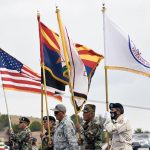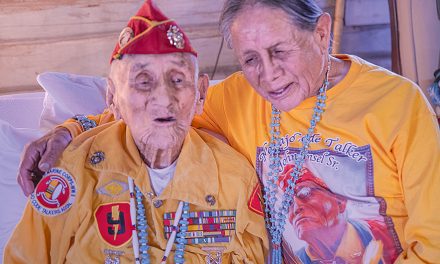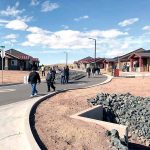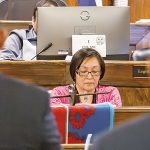
Capital Briefs
Tate’s owner to pay $450,000 to FTC
WASHINGTON – The Federal Trade Commission on July 29 announced an agreement with Richard Berry, the owner and manager of a group of bankrupt auto dealerships in Arizona and New Mexico, to resolve charges that he and the dealerships deceived consumers and falsified information on vehicle financing applications.
Many of the affected consumers are members of the Navajo Nation.
If approved by the Arizona district court, Berry, would pay $450,000 to the FTC.
The FTC reached an earlier settlement with the four dealerships: Tate’s Auto Center of Winslow, Tate’s Automotive, Tate Ford-Lincoln-Mercury, and Tate’s Auto Center of Gallup.
The Navajo Nation Human Rights Commission said it has been collecting written complaints by Navajo consumers against Tate’s. The data from the complaints indicated that Tate’s alleged to commit unlawful and unfair business practices.
In 2014, the commission forwarded its findings to the FTC. After reviewing the commission’s findings, the FTC then filed a complaint against Tate’s with U.S. District Court for the District of Arizona in 2018.
Tate’s was accused of falsifying consumer information on financing documents. When consumers provide factual information when filing complaints, it’s difficult for retailers to dismiss filed complaints against them.
Leonard Gorman, the commission’s executive director, said, “Retailers need to treat consumers fairly and without deception.
“When retailers conduct business in the Navajo language, they need to keep in mind that the Navajo language is sacred and meaningful spoken words,” he said. “When retailers say in the Navajo language, ‘We will help you,’ and that help must be without fabrication and without misinformation.
“The commission encourages Navajo consumers to take the necessary time to make a decision while making a large purchase because to get a corrective action may take years to get a final answer,” he said.
“The commission is hopeful some amount of money from the Tate’s settlement would go back to the Navajo consumers from Tate’s auto inappropriate dealing,” he said.
Nation works to ensure tribes benefit from infrastructure act
The Navajo Nation Washington Office continues to work closely with state and congressional leaders to ensure that tribal nations benefit from the proposed $1 trillion Infrastructure Investment and Jobs Act currently being debated in Congress.
The Nation is working with Utah Gov. Spencer Cox, Utah Sen. Mitt Romney, Arizona Sen. Kyrsten Sinema and others to ensure billions of dollars allocated for tribal water projects remain in the bill.
Specifically, the bill would create a $2.5 billion to the “Indian Water Rights Settlement Completion Fund” for Secretary of the Interior Deb Haaland to pay approved water settlements.
This means the Navajo-Utah Water Rights Settlement Act, which was passed by Congress last December, would be eligible.
The bill also provides $3.5 billion for the U.S. Indian Health Service for water and sanitation projects, which would help bring more clean water to homes for Navajo families.
President Jonathan Nez said, “Funding this settlement will result in new infrastructure that will bring clean water to those that desperately need it in the Utah portion of the Navajo Nation where more than 40-percent of Navajo households lack running water and/or adequate sanitation.”
The bill also includes billions of dollars for roads, bridges, broadband, climate resiliency, environmental remediation, and electric infrastructure.
The president’s office said the Nation is finalizing a list of projectS for the $1.8 billion it received through the American Rescue Plan Act. The list includes more than 9,000 projects at a cost of over $20 billion.
Millions, billions for tribes in infrastructure act
WASHINGTON – The bipartisan Infrastructure Investment and Jobs Act proposes the strongest investment in America’s infrastructure in more than a century without raising taxes on everyday Americans, according to a press memo from Sen. Kyrsten Sinema, D-Ariz.
The legislation is the result of bipartisan negotiations led by U.S. senators Sinema and Rob Portman, R-Ohio, with senators from both parties and President Biden.
Highlights include a $110 billion investment to upgrade America’s roads and bridges, $65 billion to deploy high-speed broadband, expand broadband internet access, and help families afford broadband service, a strong investment in American public transit including the biggest investment in passenger rail since the creation of Amtrak.
The proposal is currently being considered by the full Senate.
Tribes and Native communities
The press memo continues, tribal communities in Arizona will benefit from the act with investments in transportation and water infrastructure, broadband deployment, and security programs, creating jobs and expanding economic opportunity while respecting tribal sovereignty.
The memo lists the following:
• Tribal water infrastructure: The act invests $3.5 billion in the Indian Health Service Sanitation Facilities Construction program for water infrastructure and resiliency.
• Water rights settlements: The act provides necessary funding to complete all currently-authorized Indian water rights settlements – including infrastructure needed for the Southern Arizona Indian Water Rights Settlement with the Tohono O’odham Nation, completing the Gila River Indian Community Water Rights Settlement, and funding the White Mountain Apache Tribe’s Water Rights Settlement.
• Tribal broadband: The act sets aside $2 billion for the Tribal Broadband Connectivity Program, which was established by the December COVID-19 relief law. The program will be made available to eligible Native American, Alaska Native, and Native Hawaiian entities.
• Bureau of Indian Affairs Road Maintenance Program: The act authorizes $50 million for the Road Maintenance Program for fiscal 2022, with increases of $2 million per year through fiscal 2026.
• Tribal cybersecurity grants: The act establishes a new federal cybersecurity grant program that includes tribal governments.
• Nationally Significant Federal Lands and Tribal Projects Program: The act amends this federal program by allowing smaller projects to qualify, and allows 100% federal share for tribal projects.
• Tribal High Priority Projects Program: The act reinstates and provides funding for the program at $30 million for each of the next five years.
• Raising the voices of Native American communities: The act establishes a new assistant secretary for tribal government affairs under the U.S. Department of Transportation.
• Tribal climate resilience: The act provides $216 million for tribal climate resilience, adaptation, and community relocation planning, design, and implementation of projects that address the varying climate challenges facing tribal communities across the country.
The act also is supported by groups including U.S. Chamber of Commerce, Business Roundtable, National Association of Manufacturers, AFL-CIO, National Retail Federation, Bipartisan Policy Center, North America’s Building Trades Unions, and American Hotel and Lodging Association – as well as more than 360 mayors in all 50 states.
$2M resolution for To’Hajiilee health center signed
TO’HAJIILEE – A Navajo Nation Council resolution that allocates $2 million for the health center for the Canoncito Band of Navajos was signed on Sunday.
The health center is a tribal nonprofit corporation and Public Law 93-638 facility. It offers primary care including dental, pharmacy, optometry, podiatry, audiology and diabetes and works closely with the Navajo Nation health programs.
The $2 million investment will cover a shortfall in the health center’s expansion project, which is 60% complete. The expansion includes 9,200-square-feet added to the existing 11,500-square-foot facility. The expansion will provide operational space for more than 37 health care providers and an increasing number of patients.
President Jonathan Nez said, “The frontline warriors with the To’Hajiilee health center continue to do a great job mitigating the virus throughout the pandemic. With the expansion of the health care center, I’m confident that the staff will remain devoted to providing services to ensure the well-being of the Navajo people.”
The resolution was sponsored by Delegate Jamie Henio and was unanimously approved by council on July 22. The expansion is expected to be completed this fall.
Flags at half-staff for Army veteran Lynch
All flags on the Navajo Nation were flown at half-staff on Wednesday in honor and memory of World War II Army veteran and prisoner of war Thomas Lynch Jr., who passed away July 27 at the age of 98.
He was Ásh??hí and born for Kin?ichíi’nii, and was born in Wide Ruins, Ariz. He lived in Window Rock at the time of his passing.
Lynch served from May 1943 to December 1945 with the U.S. Army’s 42nd Rainbow Division. He was captured during the Battle of the Bulge and was held by the Germans for nearly four months, until his release in April 1945.
He was honorably discharged with the rank of corporal with four medals, including the Good Conduct Medal, World War II Victory Medal, American Campaign Medal, and European-African-Middle Eastern Campaign Medal with two Bronze Stars. He was also awarded the Navajo Nation Veterans Medal.
Following his military service, Lynch served as a realty specialist with the Bureau of Indian Affairs for 35 years in Window Rock. He was a devoted husband of 69 years to Helen (Oliver) Lynch, father of two daughters and grandfather of one.
Services for Lynch were held on Wednesday at the Fort Defiance Veterans Cemetery.
Interior official hears about Chaco Canyon, public safety, schools
WINDOW ROCK – On July 28 in Crownpoint, Navajo Nation officials met with Bryan Newland, Interior’s deputy assistant secretary and the nominee for assistant secretary for Indian Affairs, to discuss issues including fee and trust land, Chaco Canyon, public safety, infrastructure and boarding schools.
Vice President Myron Lizer said, “Working together with the Navajo Nation Council, we present a strong and united voice at the federal level. It is important that careful coordination continues with our federal partners to help secure more resources and policy changes to help our people.”
The Navajo Nation group, which included several delegates, told Newland more police officers are needed, as are justice centers in Window Rock and Shiprock.
After this meeting, Newland met with Navajo people who own allotments to hear their concerns over a proposed buffer zone to prevent oil and gas development within Chaco Canyon park.
Newland also attended the opening of a newly rebuilt Bureau of Indian Education school at the Laguna Pueblo and met with students and faculty at the BIE-operated Southwestern Indian Polytechnic Institute, one of only two BIE-operated colleges.
Newland also participated in a listening session on July 29 hosted by the Pueblo of Isleta with both Navajo and Pueblo leadership to discuss drought impacts and water infrastructure needs in the area.
Lizer, Yee discuss college savings plan
WINDOW ROCK – For most parents looking for a way to save for their child’s college education, a 529 college savings plan is a wise choice. The money you invest in one of these accounts grows tax-free if you use the funds toward eligible education expenses.
The Arizona 529 Plan is a college savings plan named after Section 529 of the Internal Revenue Code. The 529 plan is designed to provide a way to save for a child’s educational future.
Vice President Myron Lizer, a member of the Statewide Task Force on Financial Literacy, on July 30 joined Arizona State Treasurer Kimberly Yee to discuss the 529 savings program at the Inter-Tribal Association of Arizona’s meeting of tribal leaders in Phoenix.
Lizer said, “Through the partnership with Treasurer Yee, many opportunities and resources are easily accessible for tribal families and students to begin a successful financial journey.”
Yee said, “Thank you to Navajo Nation Vice President Lizer for connecting my office and the resources we provide to all of Arizona’s tribes. All Arizonans deserve the opportunity to excel in financial literacy and to save for the future education of their families.”
‘Christmas in July’ held at Cornfields
WINDOW ROCK – Last week, volunteers delivered a variety of gifts to families at Cornfields Chapter, in an event called “Christmas in July.”
The drive-thru was open to the public. The gifts included toys, educational supplies, food, personal protective equipment, and household items.
Delegate Vince James, who represents the area, said, “The pandemic may have hindered Christmas this past year, but our ‘Christmas in July’ event brightened the faces of our veterans, elderly, and our children from the Cornfields community.”
Glenda Wheeler, organizer and sponsor for the Christmas in July event, said the kids, elders, and veterans who were affected by COVID-19 drove her. Wheeler wanted to bring a joyous time to families who lost loved ones due to the pandemic.
Lucas Garcia, executive director of Colorado Creating Change, a nonprofit, was asked by Wheeler to help deliver gifts to Cornfields. Garcia responded almost immediately and was worried they would not deliver enough gifts, but people associated with the organization stepped up and donated many items.
Garcia’s organization has delivered food, water, PPE, and hygiene projects to 31 indigenous communities of the Navajo Nation and in South Dakota.
Wheeler received assistance from Cornfields Chapter, Apache County District 3, Ganado Fire District, Navajo Head Start, Damon-Bahe Boxing, Diné Naazbaa’ Partnership and Navajo & Hopi Families COVID-19 Relief Fund.








 Highway 264,
Highway 264, I-40, WB @ Winslow
I-40, WB @ Winslow